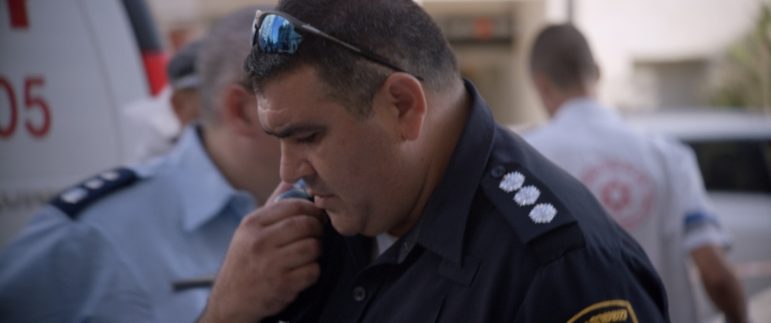The opening of the festival took place as usual under the stars in the Sultan’s Pool at the heart of Jerusalem. MC-ed by the charismatic Lior Ashkenazi, the opening included not only in-person greeting by Israel’s President, Reuven Rivlin, but also video tributes from other Israeli dignitaries. The crowd booed when Miri Regev’s face came on the large screen. This was a telling welcome for the Minister of Culture, notorious for her repressive attitudes toward filmmakers. The awards also didn’t go smoothly. Katriel Schory, one of the most respected figures in the Israeli film industry, who headed the Israel Film Fund for the last 20 years, was recognized for his service by a lifetime achievement award. When Schory took the mic, instead of the usual thanks of the Oscar speech, Schory gave a searing rebuke to the current Israeli culture policies for censoring the filmmakers whose work is critical of Israel. Although the opening film of the festival was a highly entertaining Korean “Parasite,” by Joon-ho Bong, even watching this engrossing dark comedy-cum-family drama-cum-thriller, it was impossible to ignore the broader Israeli context.
“Chained” By Yaron Shani
In 2009 a young Israeli director Yaron Shani, together with Palestinian filmmaker Scandar Copti made “Ajami,” a dark probing film set in Jaffa. “Ajami” not only showed the complex dynamics between Israelis and Palestinians within the borderlands of this town, but also introduced a unique approach to filmmaking, straddling the divides between fiction and documentary. The film relied on non-professional actors, unscripted dialog, and real-life locations. Instead of storyboards and rehearsals, the actors embodied the characters that were in part drawn from their own lives.
This method, which became Shani’s signature style, is an excellent fit for his new film, “Chained” (“Einaim Sheli,” in Hebrew). The plot centers on the character of disgraced Israeli cop, Rashi, played by Eran Naim, who will be familiar to the audiences from “Ajami.” Naim, who served in the Israeli Police for many years, was forced to leave following a complicated accusation. He went through a major personal crisis and had to make radical changes. The film’s story is loosely based on these events in Naim’s life. At the beginning of the film, we see Rashi as basically a happy family man and a good cop. His bulky solid figure exudes confidence whether he is supporting his wife through fertility treatment or answering the call of duty. Already in the first scene, he saves a child from an abusive father. In the next, he rushes to the scene of heinous act—a group suicide of a father and two children. The pain and violence of the situations involving parents and children foreshadow the events to come.

Still from “Chained.”
Rashi’s character is complicated in two encounters with teenagers. The first is with his step-daughter. He wants to protect her but ends up imposing an unreasonable discipline on her and alienating both her and her mom. The second encounter is with teenagers who are allegedly dealing drugs in a park. He conducts an invasive search that causes the parents to file a complaint of sexual abuse. The situation is complicated: on the one hand, Rashi is no pedophile and he genuinely tries to do his best. On the other hand, his force knows no boundaries and spills easily into violence. From there, the events spin out of control, resulting, ultimately, in a tragic ending. In its preoccupation with the theme of violence by an agent of Israeli state, “Chained” resonates with the current moment, in which police brutality is increasingly a hot subject in Israeli society, expressed most recently in the Ethiopian protests.
The film was a long time in the making. Shani led his actors to embody their characters—more accurately—to live as them for a year, a highly unusual and demanding process. During the filming, his crew shot 350 hours of footage of interactions between characters, with dialog emerging naturally out of given situations. As Shani explained in the q&a after the film, they kept two cameras rolling and used only natural light. The result is a film, which although categorized as fiction, has nevertheless the rawness and sense of reality of a documentary. The actors don’t play characters—they live them. The trade off, explains Shani, is the lack of cinematic sophistication. The mise-en-scene, the camera angles, and length of shots are determined by the dynamic between the characters, and not predetermined by art director and DP. Moreover, the final script gets written in the editing room, where the filmmaker pieces together the story out of hundreds of hours of footage, much like in the making of documentaries.
“Chained” is so intense and so emotionally charged, that the audience around me at the screening were gasping and tearing up. Watching it is not easy, but the pay-off is entry into the lives of fully realized, morally complex characters. At the festival, it won the Haggiag Competition for Best Israeli Feature Film, the Audience Award, and the Best Actor Award for its star, Eran Naim.